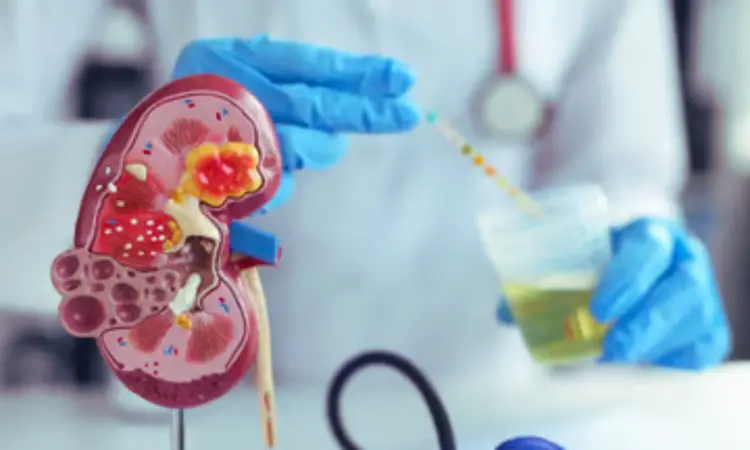- Home
- Medical news & Guidelines
- Anesthesiology
- Cardiology and CTVS
- Critical Care
- Dentistry
- Dermatology
- Diabetes and Endocrinology
- ENT
- Gastroenterology
- Medicine
- Nephrology
- Neurology
- Obstretics-Gynaecology
- Oncology
- Ophthalmology
- Orthopaedics
- Pediatrics-Neonatology
- Psychiatry
- Pulmonology
- Radiology
- Surgery
- Urology
- Laboratory Medicine
- Diet
- Nursing
- Paramedical
- Physiotherapy
- Health news
- Fact Check
- Bone Health Fact Check
- Brain Health Fact Check
- Cancer Related Fact Check
- Child Care Fact Check
- Dental and oral health fact check
- Diabetes and metabolic health fact check
- Diet and Nutrition Fact Check
- Eye and ENT Care Fact Check
- Fitness fact check
- Gut health fact check
- Heart health fact check
- Kidney health fact check
- Medical education fact check
- Men's health fact check
- Respiratory fact check
- Skin and hair care fact check
- Vaccine and Immunization fact check
- Women's health fact check
- AYUSH
- State News
- Andaman and Nicobar Islands
- Andhra Pradesh
- Arunachal Pradesh
- Assam
- Bihar
- Chandigarh
- Chattisgarh
- Dadra and Nagar Haveli
- Daman and Diu
- Delhi
- Goa
- Gujarat
- Haryana
- Himachal Pradesh
- Jammu & Kashmir
- Jharkhand
- Karnataka
- Kerala
- Ladakh
- Lakshadweep
- Madhya Pradesh
- Maharashtra
- Manipur
- Meghalaya
- Mizoram
- Nagaland
- Odisha
- Puducherry
- Punjab
- Rajasthan
- Sikkim
- Tamil Nadu
- Telangana
- Tripura
- Uttar Pradesh
- Uttrakhand
- West Bengal
- Medical Education
- Industry
Finerenone arrests CKD progression by effecting early reduction of albuminuria in diabetes patients

USA: Early albuminuria reduction with finerenone (Kerendia) accounted for a large proportion of the treatment effect against chronic kidney disease (CKD) progression in patients with type 2 diabetes (T2D), findings from a post-hoc mediation analysis shows. Findings were published online in the Annals of Internal Medicine on December 5, 2023.
The pooled analysis used data on 12,512 patients from the FIGARO-DKD and the FIDELIO-DKD trials. The researchers showed that a reduction in urine albumin-to-creatinine ratio (UACR) by four months mediated 84% of the treatment effect on kidney outcomes and 37% of the effect on cardiovascular (CV) outcomes over 4 years.
In diabetes patients, the American Diabetes Association (ADA) guidelines recommend lowering UACR by 30% with therapy. These data support these guidelines by showing that albuminuria reduction is the causal pathway of both cardiovascular and kidney protection.
"Clinicians caring for diabetes patients should not only screen for kidney disease with annual UACR testing but also may consider monitoring UACR level to gauge treatment benefits," the researchers note.
Finerenone was approved by the US Food and Drug Administration (FDA) in July 2021. It was the first non-steroidal, selective mineralocorticoid receptor antagonist to slow CKD progression in T2D. It is indicated to reduce the risk of sustained eGFR decline, cardiovascular death, end-stage kidney disease, hospitalization for heart failure, and non-fatal myocardial infarction (MI) in adults. There is no information on whether a finerenone-induced change in UACR mediates CV and kidney failure outcomes.
Rajiv Agarwal, Richard L. Roudebush VA Medical Center and Indiana University, Indianapolis, Indiana, and colleagues aimed to quantify the proportion of kidney and CV risk reductions over four years mediated by a change in kidney injury, as measured by the change in log UACR between baseline and month 4.
For this purpose, the researchers performed a post hoc mediation analysis using pooled data from 2 phase 3, double-blind trials of finerenone across several clinical sites in 48 countries. 12 512 patients with chronic kidney disease and type 2 diabetes were included.
Separate mediation analyses were performed for the composite kidney (kidney failure, sustained ≥57% decrease in eGFR from baseline, or kidney disease death) and CV (nonfatal MI, cardiovascular death, hospitalization for heart failure, or nonfatal stroke) outcomes.
The study led to the following findings:
- At baseline, the median UACR was 514 mg/g. A 30% or greater reduction in UACR was seen in 53.2% of patients in the finerenone group and 27.0% of patients in the placebo group.
- Reduction in UACR (analyzed as a continuous variable) mediated 84% and 37% of the treatment effect on the kidney and cardiovascular outcomes, respectively.
- When change in UACR was analyzed as a binary variable (that is, whether the guideline-recommended 30% reduction threshold was met), the proportions mediated for each outcome were 64% and 26%, respectively.
"We hope that other therapies will similarly test medication in large randomized trials to evaluate whether these benefits are limited to finerenone or are broadly applicable to other treatments," the researchers wrote.
"The upstream mechanisms that underlie albuminuria reduction -- in this case, mineralocorticoid receptor overactivation -- may be critically important and distinct from other mechanisms," they concluded.
Reference:
Agarwal R, et al "Impact of finerenone-induced albuminuria reduction on chronic kidney disease outcomes in type 2 diabetes: A mediation analysis" Ann Intern Med 2023; DOI: 10.7326/M23-1023.
Dr Kamal Kant Kohli-MBBS, DTCD- a chest specialist with more than 30 years of practice and a flair for writing clinical articles, Dr Kamal Kant Kohli joined Medical Dialogues as a Chief Editor of Medical News. Besides writing articles, as an editor, he proofreads and verifies all the medical content published on Medical Dialogues including those coming from journals, studies,medical conferences,guidelines etc. Email: drkohli@medicaldialogues.in. Contact no. 011-43720751


